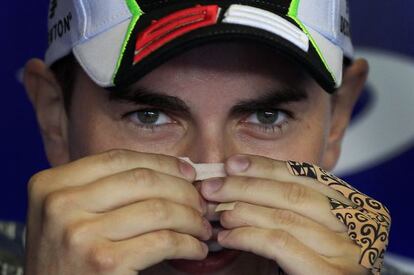"Nothing should be unforgiveable"
World champion rider Jorge Lorenzo talks about the fear of falling


Spanish MotoGP rider Jorge Lorenzo is unsure what to say when he is asked whether his win at last Sunday's Italian Grand Prix was down to him, or down to his Yamaha. He knows that he has a great bike this year, albeit not the best; and he also knows that his performance has been exceptional. That's why he can't stop smiling. He's looking for his third championship title in the MotoGP category - and he knows that nothing is impossible.
Question. Did you need to win in Mugello?
Answer. Yes, we really needed it. The last two races were very disappointing. We lost a lot of points in Le Mans. So we need to carry on like this.
Q. Is your Yamaha inferior to the Honda?
A. Right now, yes it is, but I don't know by how much.
Q. You have confessed to your most intimate circle that you are not planning on leaving the circuit in a wheelchair. Are you obsessed with safety?
A. Yes. It was really hard for me to be aware of the risks when I was 20 years old. I had seven falls before I came to understand that I could do myself a lot of damage. It wasn't the first nor the second. I needed seven serious accidents: the last one was in Montmeló, in 2008. The bump on the head could have had serious consequences, but luckily that wasn't the case. Bit by bit I started having fewer falls. When you are 20 you are really ambitious, you want to win as quickly as possible and show the world how good you are. It happened to Valentino [Rossi], Dani [Pedrosa], to me, and now it is happening to [Spanish rookie Marc] Márquez.
Q. Has your perception of the risks of the sport become more acute since you lost part of your finger in the Phillip Island crash?
A. Yes, maybe a little more. But I am most afraid of a heavy crash between two bikes: there's a greater risk because the impact is unexpected, and you are not thinking about the fall as you would when you are on the limit; you brake late or you open the throttle too early. This is the only sport in which the rules are still not properly defined. We run a lot of risks.
Q. You've spoken about fear. Do you feel fear when you race?
A. When I get out onto the track the last thing I think about is the fact that I could have a fall. I'm much more focused on improving the bike, on my riding, or on going faster. In 2008, when I came back after the accident in Montmeló, the first thing that I thought was that I could hurt myself. Now I don't think about that. You think about the luck that you had by controlling a fall, but also about what could have happened if you hadn't been so lucky.
Q. Where is the line between fear and being aware that you could do yourself an injury?
A. Before I wasn't scared about running into another rider in the braking zone. After I hurt myself I became much more aware of the dangers. Now I try to calculate the risks much better when I am overtaking another rider, and I look for the braking zone that is best suited to the overtake. You can't just pass any old way and on any other corner. But you have to differentiate between logical fear and illogical fear. If you are too afraid then your performance suffers. Being aware of the danger helps you to avoid falls. The dilemma lies in distinguishing between the two.
Q. Your father taught you how to ride, but you later faced problems as you moved through the sport. Have you given him a second chance after having had so many disagreements?
A. My father is now the sporting manager of Rick [Cardús, Lorenzo's best friend]. And we've started training together again. I wouldn't call it a second opportunity, but rather that I didn't agree with some of the things that he did that were damaging to me. We got mad with each other. But in the end, you only have one mother and one father, and everything they do is because they want the best for you.
Q. What, for you, is unforgivable?
A. Nothing should be unforgivable. You have to have a lot of heart and no bitterness to be able to forgive everything.
Tu suscripción se está usando en otro dispositivo
¿Quieres añadir otro usuario a tu suscripción?
Si continúas leyendo en este dispositivo, no se podrá leer en el otro.
FlechaTu suscripción se está usando en otro dispositivo y solo puedes acceder a EL PAÍS desde un dispositivo a la vez.
Si quieres compartir tu cuenta, cambia tu suscripción a la modalidad Premium, así podrás añadir otro usuario. Cada uno accederá con su propia cuenta de email, lo que os permitirá personalizar vuestra experiencia en EL PAÍS.
En el caso de no saber quién está usando tu cuenta, te recomendamos cambiar tu contraseña aquí.
Si decides continuar compartiendo tu cuenta, este mensaje se mostrará en tu dispositivo y en el de la otra persona que está usando tu cuenta de forma indefinida, afectando a tu experiencia de lectura. Puedes consultar aquí los términos y condiciones de la suscripción digital.







































